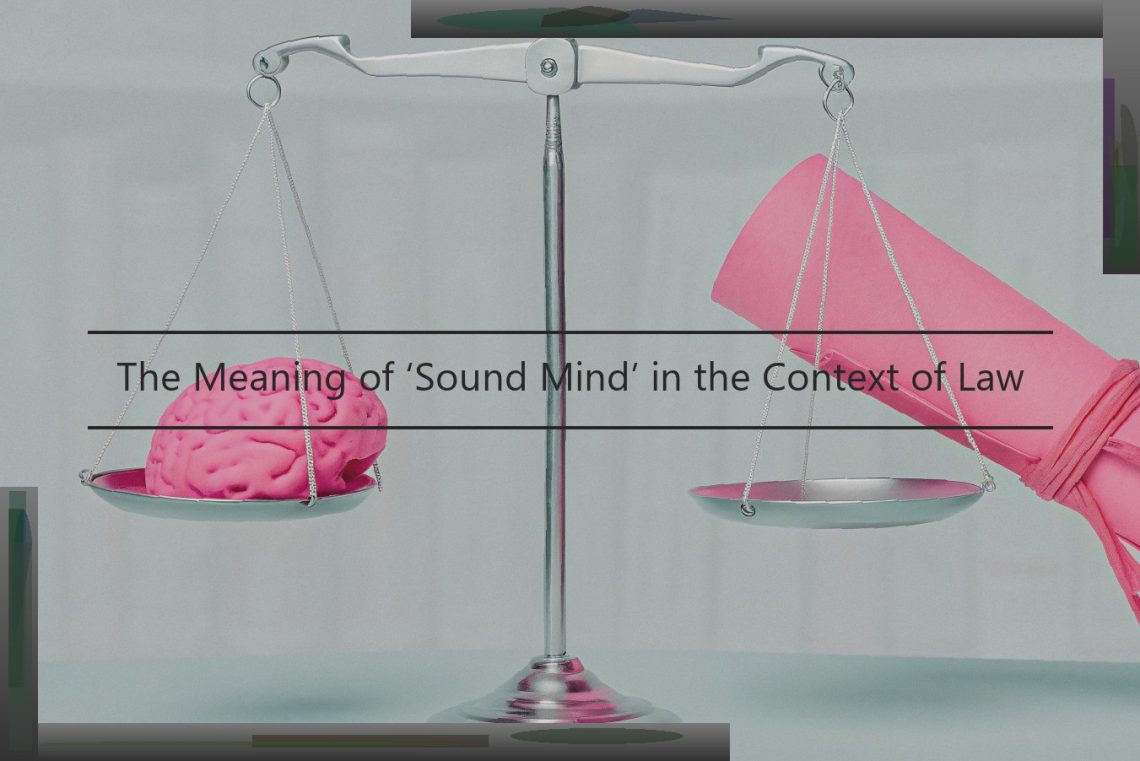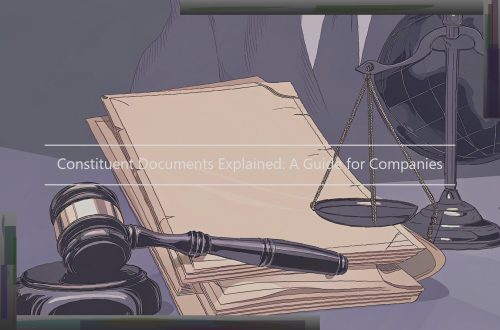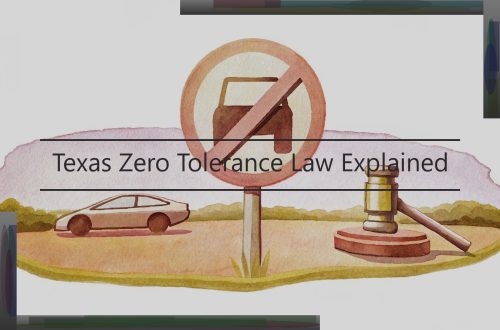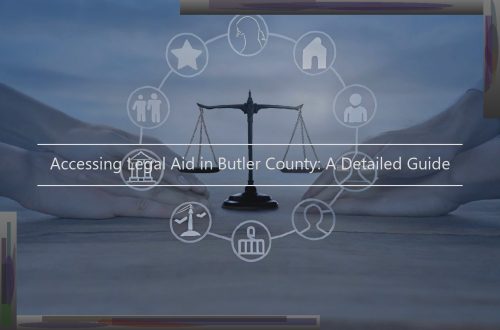
The Meaning of ‘Sound Mind’ in the Context of Law
The Definition of ‘Sound Mind’ in a Legal Framework
"Sound mind" is a concept that finds resonance across both common law and civil law jurisdictions, albeit sometimes under different denominologies. Under common law in the United States, "sound mind" is most commonly referenced in the context of testamentary capacity, particularly with respect to wills. For instance, in the context of a will, a person must possess testamentary capacity in order to make a valid and enforceable will. Testamentary capacity is achieved by a person having "sufficient mental ability at the time of making the will to understand: (1) the property of which he or she was disposing; (2) the natural objects of his bounty, such as children or grandchildren, if any; and (3) the nature of the testamentary act, such as the executing of the will," Rosenblum v. Odland, 248 Mich. App. 468, 640 N.W.2d 580 (1999); Cramer v. Flint Board of Education, 317 Mich. App. 149, 893 N.W.2d 216 (2016); (Rogers v. Rogers, 230 Mich. App. 28, 583 N.W.2d 480 (1998). See also, Matter of Estate of Baker, 199 Mich. App. 662, 502 N.W.2d 700 (1993) (stating that in a will contest, the relevant standard in Michigan for establishing testamentary capacity necessary to create a valid will is whether the testator understood: "the nature and extent of his property; the natural objects of his bounty, including persons who would ordinarily benefit from his bounty; and the nature, extent and effect of the disposition he wishes to make."). However, testamentary capacity is not a static concept, is presumed to exist at the time of the making of the will, and there is no bright line to determine when a person loses their testamentary capacity and it can vary according to the circumstances of each case. See e.g., Graham v. Graham, 276 Mich. App. 622, 740 N.W.2d 679 (2007). And a court may determine quoad hoc that a person has testamentary capacity to execute a specified instrument or instruments.
In addition to U.S . common law systems, variations of the concept of "sound mind" exist in other common law systems. For example, under English common law, "sound mind" (or "disposing mind" as it is sometimes referred to) is likewise associated with testamentary capacity. For example, the Court of Appeal (Civil Division) in England in Banks v Goodfellow (1870) 5 L.R. Ex. 179 defined an English equivalent of testamentary capacity as follows: In a will, the testator must know and appreciate to whom he is giving his property, must understand and recollect the extent of his property, and must have an understanding of the nature of the act he is doing, so that he knows he is giving away something which was previously his own, and that he will not be able to alter his mind afterwards. He must also be able to comprehend and appreciate the claims upon him, if he chooses to exert his testamentary powers, in favour of those who feel that they have a natural claim upon him, to the extent at least of excluding strangers from participation in his bounty. The concept of "sound mind" also exists in other common law systems outside the United Kingdom. For example, under Australian statute, the Wills Act 1968 provides that a person has the capacity to make a will if, when making the will, he/she has "the ability to: (a) understand the nature and effect of making a will; and (b) understand the extent of the property of the testator at the time; and (c) understand the claims on the testator’s estate that any person could have; and (d) hold a general the memory of the person with whom he or she had intimate relations in his or her lifetime." A similar concept is enforced under Canadian law and is referred to as testamentary capacity. Civil law jurisdictions, meanwhile, employ a number of different concepts that mirror somewhat closely to "sound mind", including "testamentary capacity", "working ability", and "free of any dementia attributable to senility, madness or any other mental impairment".
Why ‘Sound Mind’ is Essential to Legal Capacity
Consideration of the extent to which a person is of sound mind is critical in many legal contexts. From the perspective of a future client, the most common legal scenario in which the soundness of mind is involved is that of determining whether or not a person has legal capacity to enter into a contract. Even though the law usually presumes that a person is competent, certain prevailing legal standards dictate that when a person is not of sound mind this person may lack the necessary cognitive ability to legally enter into a contract. In those ways the concept of soundness of mind becomes particularly relevant to the creation of wills.
Because wills and contracts share so many attributes, a number of courts determining whether or not a will is valid have looked to statutory provisions governing the validity of contracts to determine whether or not a person was of sound mind at the time the will was created. Statutory language pertaining to the elements of capacity required under the Uniform Probate Code and §158 of the Restatement (Third) of Trusts have invoked in determining whether or not a person was of sound mind when they executed a will.
How to Analyse the ‘Sound Mind’
There are certain procedures and tests commonly used to assess whether a particular individual is of sound mind. For example, it is essential that the subject of a duly attested will understands its contents, is free from duress, and has sufficient mental capacity to have comprehended acceptably the nature of the testamentary act. In most cases, the question of whether the testator is of sound mind is determined by the facts presented by the animus testandi (the desire for or intention to dispose of one’s property by will) and by the fact of having executed the will in a manner that meet the requirements of the statutory scheme. The standard that is typically used to test the soundness of mind of an individual who executes a testamentary instrument such as a will or trust is whether the person has "sufficient mental capacity to understand the nature of the business, the extent of the property, and the nature of the effect of executing the document." Cal. Prob. Code § 6100.5(a). Only when the instrument is based on an intelligent and voluntary decision by a person possessing the requisite capacity are the contents of that instrument deemed valid. In In re Estate of McCoy, the California Court of Appeal discussed the evidentiary burden that parties have in establishing lack of testamentary capacity in order to overcome the presumptive validity of a duly attested will that meets the formalities required by law. In such case, the court stated: "Proof of a lack of testamentary capacity is a prerequisite to abrogation of a will based on the absence of a properly attested signature. . . . A well-settled rule in this state is that a duly and properly executed will is presumed to be a valid will of the testator during lifetime and is entitled to probate after death." Considering the standard, the court concluded that a presumption of capacity arising from a signed and attested will is "a rational judgment based on past experiences and an accumulation of facts and inferences." Whereas a presumption is a conclusion drawn by a trier of fact, a determination is a finding made by the trial judge. However, an individual cannot sign a will unless he or she possesses the requisite capacity. Thus, after examining In re McCoy, it is apparent that a will can only be probated in California if certain evidentiary burdens have been met. In order to show lack of testamentary capacity, it is incumbent on the party contesting the instrument to provide specific evidence that demonstrates the decedent did not know the nature of his or her business and the extent of his or her property. In other words, the objector must provide sufficient circumstances that shows decedent’s will was not the result of his or her insightful decision making.
Case Examples of Sound Mind for Determining Capacity
Understanding the legal precedents concerning "sound mind" requires an examination of their disposition and rationales. Numerous legal cases have encountered scenarios for the applicant to establish sound mind. In the 2002 case of Estate of Jack A. Gifford v. Alabama, a Georgia resident had moved to Alabama and executed a will after his health improved following the death of his wife. However, the court found that while Gifford was aware of his property and the family involved, he was not of sound mind due to his medical condition and the effect of certain medications and made its decision based on the totality of the circumstances. The court order reversed the trial court’s judgment upholding the will.
In the 2015 case of In re estate of Kathleen M. Ingham v. Buhler et al., a Florida resident contested the validity of a 2008 will executed in North Carolina on the grounds that her mother was of unsound mind when she executed the will based on neuropsychiatric evaluations. In Haynes v. Haynes, No. 91,578 (Miss. 2004), a man on psychiatric medication had signed a will disinheriting all heirs except his wife. While the trial court upheld the will’s validity, the state supreme court observed that in the absence of a will the property according to state law would be distributed to the decedent’s heirs, including children, grandchildren, siblings, and their descendants. But on appeal, the supreme court reversed the trial court’s ruling because the will did not adequately articulate the testator’s intentions, thereby rendering it unambiguous and revoking the earlier wills.
Sound mind is a legal concept subject to interpretation in court, however, medical doctors are not to make the determination because doing so falls solely within the expertise of a judge. Court appointments of mental health providers are authorized to conduct mental status examinations in accordance with established standards and procedures.
Difficulties in Demonstrating Sound Mind
Given how ambiguous the definition can be, proving or disproving capacity can be a challenging and fact-specific endeavor. For this reason, several courts have taken the position that the legal presumption of capacity "has great dignity and should not be overthrown except in a clear case." Knox v. Bankers Life and Casualty Co., 80 Cal. Rptr. 2d 164, 168 (Cal. App. 2000). This legal presumption puts the burden of proof squarely on the challenger.
Direct Challenge: The most common method to challenge or prove legal capacity comes from a direct attack on the validity of a particular legal or factual instrument. A person can make this kind of challenge in various forms, such as: a will, trust, affidavit, deed, contract, etc. In these scenarios, the challenger must present evidence to rebut the presumption of sound mind against a legal presumption that generally assumes the grantor was doing fine. Thus , the challenger will only succeed if he or she can show compelling evidence to demonstrate that the creator was in a subpar state of mind when intending to create some legal or factual instrument.
The Evidence: Rebutting this presumption typically carries with it one of two things: an expert and/or a motive. The most common method of rebutting sound mind is medical evidence. Usually, attorneys will gather records from medical care providers. In some cases, attorneys will collect the written opinions made by a medical doctor, psychologist, psychiatrist, nurse, doctor’s notes, etc. When family members have treated or known the decedent, they may be used to their advantage as well—though much more carefully than a trained expert.
All of this medical evidence will be used to determine not only the testator’s physical condition, but also his or her mental state. Medical records can be used to show whether or not the person had the mental faculties required to make a binding legal instrument.
Legal Implications of Not Having a Sound Mind
Lawyers representing clients regarding the estate planning issues, power of attorney issues, or guardianship issues need to understand the legal ramifications of someone not being able to act. After all, there is no set definition of "sound mind." You have to be able to argue your position in court. When you run into a potential problem you can seek medical opinion, but medical opinion cannot dictate the legal outcome. We do not expect that our clients are attorneys or have a law degree. Problems may arise, though when trying to make sound decisions. Remedies include petitioning the court to determine a person’s capacity and finding them to be incapacitated or to also revoke durable powers of attorney. An individual who is not of sound mind cannot sign a valid will, cannot serve as the executor of an estate, cannot serve as a trustee, cannot execute a durable power of attorney and/or make gifts.
A durable power of attorney is exercised when the principal becomes unable to handle their affairs and can be revoked by the principal while they are still competent or when they no longer are capable of revoking such document and revoking the durable power of attorney can be done by a Judge. The Durable Power of Attorney ends at death, incapacity or a revocation. As mentioned, if a person is not capable of signing a valid Durable Power of Attorney, then something else may need to be done. There are some cases where it is necessary to seek a guardianship diversion program. This involves a third party (e.g., a family member) petitioning the court to have a guardian appointed for an "alleged incapacitated person," which is then decided by a judge. The judge has the option to find no incapacity and decline to appoint a guardian. If a guardian is appointed, the guardian is given specific authorities and responsibilities. For example, the guardian may be given the authority to do the following: A court-appointed guardian undergoes ongoing supervision and has to file a report with the court on a regular basis. Guardianships are costly and adversarial, so avoidance is preferable.
How to Protect People with Decreased Sound Mind
The law provides for mechanisms to help in the protection of an individual who does not have a sound mind. These are guardianship and conservatorship. A guardian is an individual that is responsible for the care of another individual who is "unable to take care of himself or his property." The guardian is responsible for taking care of an individual’s personal and property matters. This includes their finances, government benefits, and even their personal safety and well-being. A guardian does not have to be related, however the court will not appoint someone as a guardian if they have a conflict of interest. A guardian is appointed by the court and serves for an indefinite period of time until the court relieves them of their duties.
A conservator is an individual that is appointed to handle the finances of another individual who is unable to do so themselves. Many individuals because of various factors become unable to handle their finances. A conservator is appointed by the court to manage an individual’s property and financial matters. A conservator is appointed for an indefinite period of time until the court relieves them from their duties . Both guardians and conservators are supervised by the court. Both of these roles require a fiduciary duty to the person being protected. A fiduciary duty is a person’s legal obligation to act in the best interest of another. The court conducts hearings and requires regular reporting from these appointed individuals. Another form of protection for an individual who is unable to take care of themselves is the ability to execute a durable power of attorney and execute a medical durable power of attorney. While a guardian is appointed when the court makes a determination that an individual is unable to protect themselves, a durable power of attorney is an advanced directive that can permit an individual to retain control over their finances. In this action, an individual would enter into a written contract that designates an agent to manage their finances on their behalf. A medical durable power of attorney is similar in nature. An individual may execute a written contract granting the power of attorney the ability to handle their medical matters when they are unable to do so.





